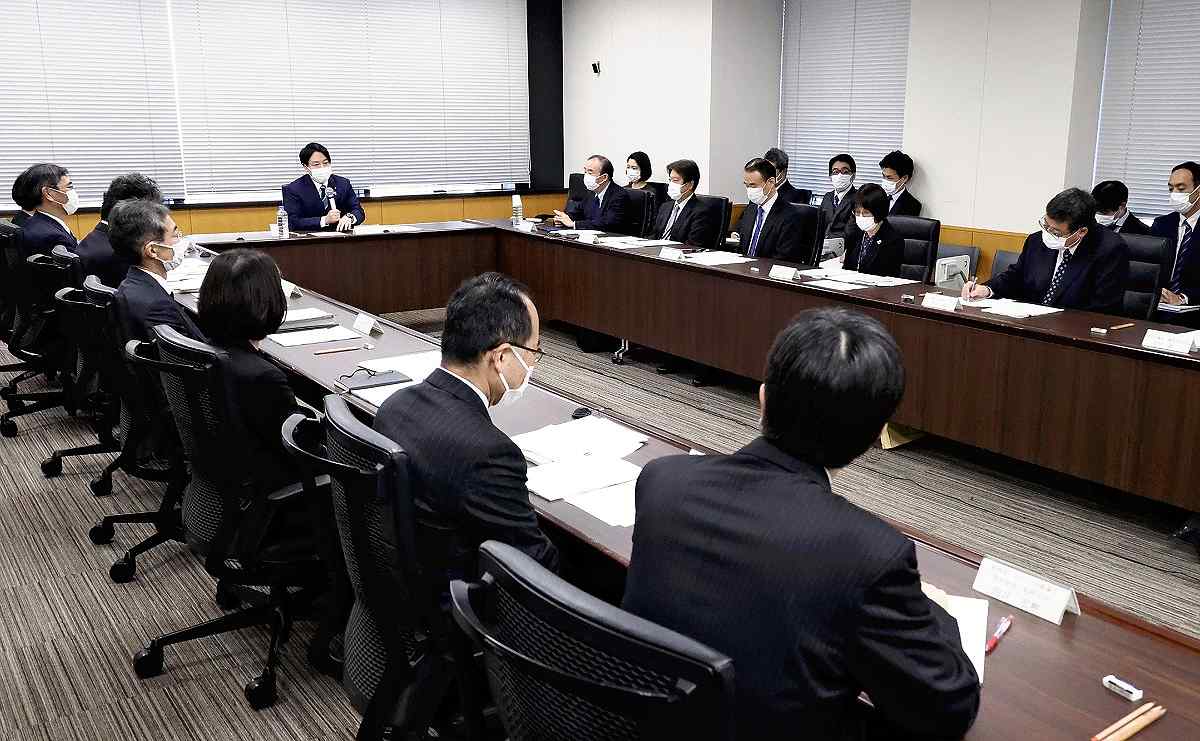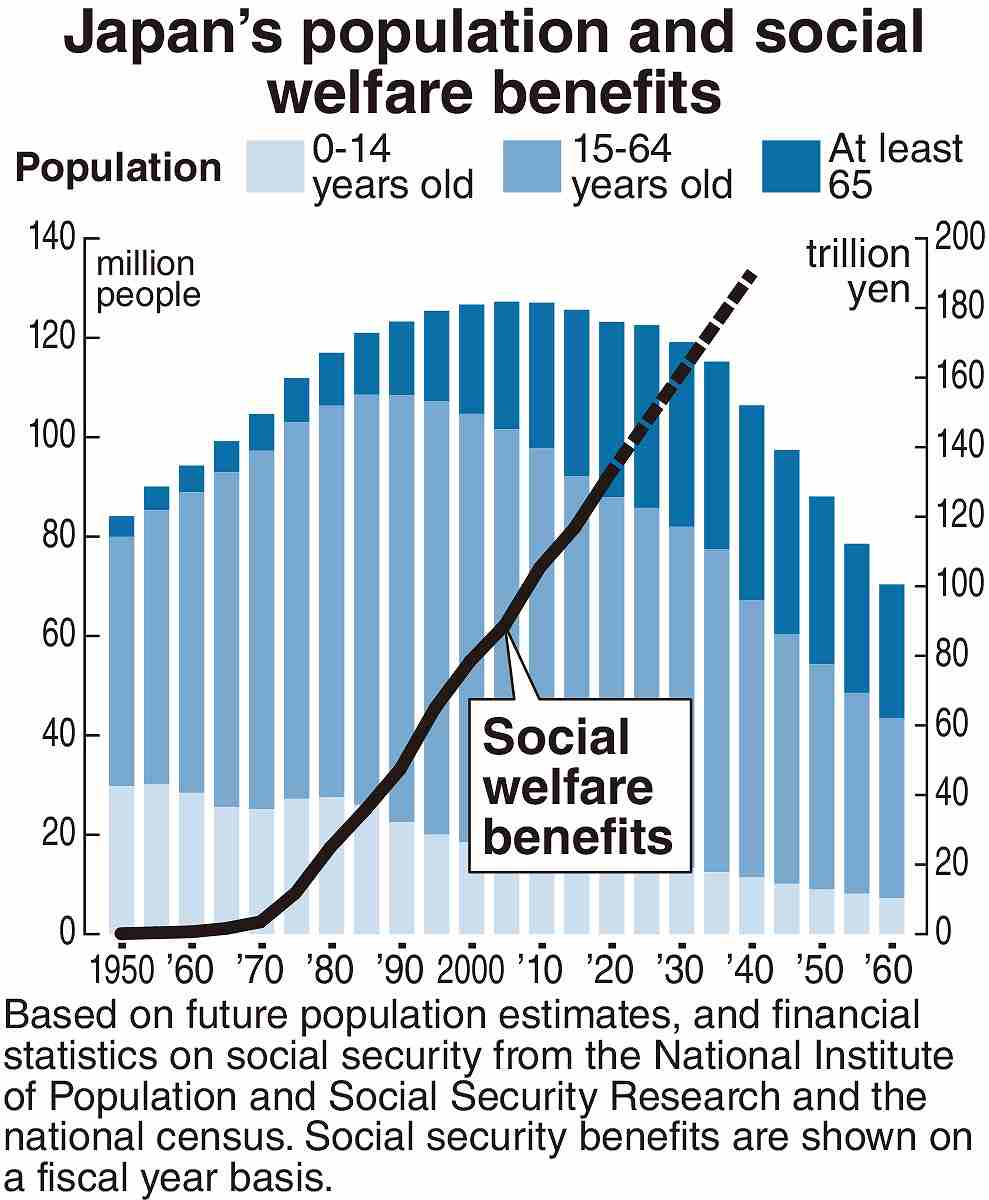
A meeting is held in Tokyo on Thursday to discuss extraordinary measures to counter the low birth rate.
21:00 JST, January 23, 2023
Full-fledged discussions have gotten underway about how to realize Prime Minister Fumio Kishida’s policy of “extraordinary measures to counter the low birth rate.”
Japan’s birth rate is declining faster than expected, so the discussion and implementation of such measures cannot be delayed. Strengthening the financial support from the government, such as child allowances, is expected to be a key step, despite the expected difficulties in securing the financial resources necessary.
The government wants to hasten the debate, but it is unclear whether discussions will proceed smoothly.
Japan’s birth rate is declining at an accelerating pace due to the trend toward delaying marriage, the decrease in the number of young women, and people marrying later in life. There have also been fewer opportunities to meet new people because of the novel coronavirus pandemic.
A 38-year-old part-time employee lives in Marugame, Kagawa Prefecture, with her office worker husband and their 4-year-old son. Considering the future cost of their son’s education, the woman thinks their life will not be easy.
“Food and utility costs are rising,” she said. “The ¥10,000 monthly child allowance all goes to living expenses. I’d be very happy if the child allowance was raised even by just ¥5,000 a month.”
The government is hurrying to take measures to combat the falling birth rate, as it considers the next 10 years to be a critical period to stop the decline. Over this period, women born in the1990s — a time when about 1.2 million babies were born each year — will enter their 20s and 30s. However, the number of births in 2022 is expected to fall below 800,000 for the first time, eight years earlier than the government expected.

The birth of fewer children is expected to decrease the number of people who will support the social security system in the future, disrupting the balance between the benefits and the burden.
This is also likely to make it difficult to maintain the pension and other social security systems.
“This can be called a quiet emergency,” a senior government official said. “We have to take action immediately.”
Draft expected in March
The government’s first meeting among related ministries and offices was held Thursday in Tokyo, chaired by Masanobu Ogura, state minister for dealing with the low birth rate. Participants confirmed that they would finalize concrete measures by the end of March, after holding five meetings to discuss such financial support as child allowances, expanding support for early childhood education and childcare services, and promoting work-style reform.
“Solving the problem of the low birth rate, and supporting children and child-rearing generations, is the most important investment for the future,” Ogura said at the meeting. “This will be key to deciding the fate of society.”
The government intends to give priority to alleviating the economic burden on child-rearing households. Therefore, in addition to director generals of the Cabinet Secretariat, Cabinet Office and Health Labor and Welfare Ministry, the panel’s members include officials of the Land, Infrastructure, Transport and Tourism Ministry, which is in charge of housing policy, and other ministries.
Kishida intends to map out specific measures based on the panel’s draft from April on, when the child and family agency is to be established. The prime minister announced his plan to present a roadmap to double child-related budget spending, in the “Basic Policies on Economic and Fiscal Management and Reform” to be approved by the Cabinet in June.
Finance resources
The government places the strongest emphasis on expanding child allowances. Kishida’s closest aide, Deputy Chief Cabinet Secretary Seiji Kihara, has insisted that the government take drastic measures, and Kishida spoke about expanding the child allowance program at a press conference on Jan. 4.
Under the current system, ¥10,000 to ¥15,000 is provided in principle per child of junior high school age or younger. The government and ruling parties will discuss eliminating the income limit and expanding the eligibility for the allowance up to 18.
However, some experts have questioned the government’s idea, saying the number of children will not suddenly increase if the allowance is raised by just few thousand yen per month. Based on these opinions, a proposal to pay ¥30,000 for a second child and ¥60,000 for a third child has also been floated.
The difficulty the government will face is securing new financial resources. According to a government source, about ¥2.55 trillion per year will be needed to expand the child allowance system.
Another proposal that has been made within the government is to have public insurance programs, such as the pension, medical care, long-term care, and employment programs, each make a small contribution to support child-raising measures and other steps.
Kishida’s impatience is also behind his decision to take extraordinary measures against the declining birth rate. His approval rating stood at the 30% level in a recent Yomiuri Shimbun survey, despite Kishida’s touting of his diplomatic achievements in visiting five countries, including a meeting with U.S. President John Biden. He also appears to be aiming to buoy his administration ahead of unified local elections in April.
The Cabinet is being forced to postpone discussions on financial resources, which remind people of tax hikes, until April or later to avoid a negative impact on the unified general elections.
Top Articles in Society
-

JAL, ANA Cancel Flights During 3-day Holiday Weekend due to Blizzard
-

Record-Breaking Snow Cripples Public Transport in Hokkaido; 7,000 People Stay Overnight at New Chitose Airport
-

Australian Woman Dies After Mishap on Ski Lift in Nagano Prefecture
-

Foreign Snowboarder in Serious Condition After Hanging in Midair from Chairlift in Nagano Prefecture
-

Train Services in Tokyo Resume Following Power Outage That Suspended Yamanote, Keihin-Tohoku Lines (Update 4)
JN ACCESS RANKING
-

Univ. in Japan, Tokyo-Based Startup to Develop Satellite for Disaster Prevention Measures, Bears
-

JAL, ANA Cancel Flights During 3-day Holiday Weekend due to Blizzard
-

China Confirmed to Be Operating Drilling Vessel Near Japan-China Median Line
-

China Eyes Rare Earth Foothold in Malaysia to Maintain Dominance, Counter Japan, U.S.
-

Japan Institute to Use Domestic Commercial Optical Lattice Clock to Set Japan Standard Time





















